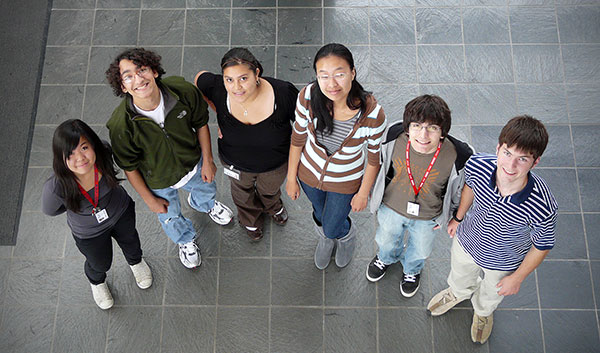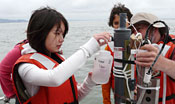You are here
High School Summer Apprenticeships 2009

During the summer of 2010, CMOP hosted nine high school students in our Summer Apprenticeship program. They worked along side scientists and graduate students performing research relative to the Columbia River Estuary. The center partners with Saturday Academy to offer this 8-week summer apprenticeship. Students were at CMOP from late June to the middle of August. At the end of the summer, students presented at the ASE Symposium.
Student Blogs
INTERNSHIP DESCRIPTIONS
Carbon Cycling in the Columbia River Estuary
Students: Megan, Jessica
Project Description Estuaries are important coastal ecosystems that represent critical habitat for many types of animals and plants. To better understand the ecology of the Columbia River Estuary, the center is investigating the role of the river in delivering nutrients and organic carbon to the estuary. Dissolved organic carbon (DOC) forms an important component of the marine carbon cycle, and yet very little is known of the character of specific compounds that comprise DOC. In the Columbia River estuary DOC production and consumption is related to water masses that enter and exit with the tides. A primary goal of our research is to identify classes of dissolved organic matter found in the estuary under different conditions (e.g. outgoing versus incoming tides, estuary turbidity maximum) in order to better understand how organic matter is being cycled in the estuary. For this we use fluorescence-based techniques that allow us to distinguish among several broad classes of compounds. For this project, the student will assist in field sampling, process samples using a spectrofluorometer, and assist in data analysis. The student will learn laboratory skills related to aquatic sciences, particularly focusing on collection techniques and chemical analyses.
Environmental Sensor Development
Students: Avalish, Tanner
Project Description One of the major scientific themes of the center is development of novel sensors for monitoring biogeochemical process in dynamic environments like the lower Columbia River. We are working on several such sensors (mostly microelectrodes), for parameters ranging from nitrate to specific types of microbial activity. The intern will assist with fabrication, calibration, field testing, and possibly field deployment of these sensors. The most important requirements for this internship are a strong background in chemistry (preferably completed AP or IB level) and some familiarity with basic electronics, interfacing and data transfer to computers, etc. Optionally, this position may also involve participating in overnight field work on board a research vessel in the Columbia River.
Internship in Ocean Observatories
Students: Matt, Alma, Maria, Monica
Project Description Ocean observatories are novel integrations of observations from environmental sensors, simulations via 3D computer models, and information flow and visualization systems, which together put environmental information at the fingertips of scientists, managers, educators and the general public. That information is essential to understand and sustainably manage the oceans and their coastal margins, under increasing human and climate stresses. The successful candidate will be integrated in the multi-disciplinary team that operates one of the most advanced ocean observatories in the world, focused on the Columbia River estuary and ocean plume (http://www.stccmop.org/saturn.) The candidates will be exposed to all aspects of the observatory, from engineering to science and outreach. Focus will be on scientific data analysis. The candidates will work under the supervision of two mentors, and will be assigned tasks that require independence, judgment, team work and communication skills. There is a strong preference for candidates with interest and skill in mathematics and in physics, chemistry or biology. Skill or ability to learn visualization and/or statistical software packages is a must. Programming skills are a plus, but not a requirement.
Remediation of Environmental Contaminants
Student: Jingxian
Project Description The apprentice will participate in research on the degradation of pollutants in the environment. In streams, sediments and groundwater, organic pollutants undergo chemical reactions that transform them into less (or sometimes more) harmful products. Understanding these degradation reactions is one of the major challenges in environmental science and engineering. The intern will participate in laboratory studies of the chemistry of contaminant remediation. This will involve measurement of organic chemical concentrations by gas and/or liquid chromatography and various types of spectroscopy. The results should help contribute to the scientific basis for regulation and remediation of environmental contamination by organic chemicals. Applicants should have completed a year of chemistry (including basic principles and laboratory techniques) by the beginning of the apprenticeship. Good math and computer skills are also required.







